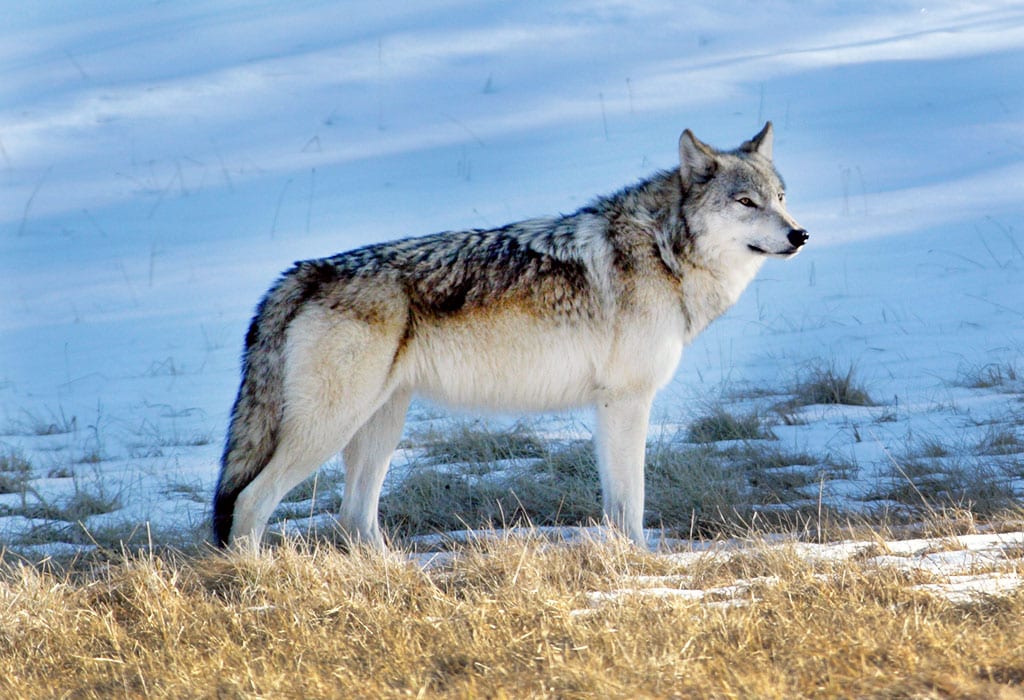The majority of people in the United States are city people. Over four-fifths of the U.S. population live in “metropolitan areas” (areas containing a core urban population of 50,000 or more). I’m one of them. I’ve chosen to make my home in Denver, Colorado (and I want to acknowledge that Denver is built on Arapaho, Cheyenne, and Ute land). Wolves were once a common sight where Denver is now, but there’s no place for them here anymore. Too many people, too many roads, not enough open space and wild land.
Other parts of Colorado are a different story. Rocky Mountain National Park and surrounding public lands could support a healthy population of wolves, if we let them. But the last wolf in Colorado was killed in 1945, and it’s going to be hard for them to make it back to the state without human intervention. To make it down from Yellowstone, they have to run the gauntlet of Wyoming, where across 85 percent of the state wolves are considered “vermin” and it is legal to shoot them on sight.
The Trump administration is proposing to remove wolves from the list of threatened and endangered species. For us city people, the consequences of this rule change may feel abstract. I’d guess most of us have never seen wolves in the wild, heard their howls, or seen their tracks. And I’m going to be perfectly honest; I think they are neat, but I don’t feel a particularly strong affinity for wolves. That may sound strange coming from a dyed-in-the-wool environmentalist and certified bunny-hugger, but I’m an invertebrate nerd. People with wolf tattoos are valid, but I can’t relate. My favorite carnivore is the Coral Pink Sand Dunes tiger beetle. What I can relate to is this: Aldo Leopold eloquently writing that “[a] thing is right when it tends to preserve the integrity, stability, and beauty of the biotic community. It is wrong when it tends otherwise.”
The delisting of wolves falls into the latter category. Wolves are integral to the wild, and to wildness. The relatively recent absence of wolves in most of the West has caused chain reactions in wild systems, harming some of our most beautiful places. Wolves balance the impacts of large elk herds by keeping them alert and moving, preventing them from camping out by streams and overgrazing the fragile banks. Wolf presence improves aquatic habitat, contributing to cool, clean waters where fish and other species can thrive. Plant communities are diverse and healthy when in the presence of wolves. Even large mammals like elk benefit from wolves, who target the weak and sick when hunting, slowing the spread of illnesses like chronic wasting disease. Delisting would open the door to hunting and trapping in places where wolves are still protected, like Washington, Oregon, California, and the upper Midwest, and would strengthen the barriers preventing wolves from coming back to still-suitable parts of their historic range like Colorado.
Anyone who values the wildness of America, who wants intact ecosystems, who believes native species belong, or who wants the opportunity to someday hear a wolf howling needs to step up and oppose this delisting, whether you think wolves are your Patronus or not. It’s about more than wolves; it’s about defending the integrity of ecosystems, keeping the Endangered Species Act strong, and not letting our dangerously shortsighted government run roughshod over our dwindling natural resources.
I’m not writing this blog for all the people with wolf tattoos; I know they already get it. But if you’ve never seen a wolf in the wild and/or you don’t particularly care to, know that this still affects you. The wild heart of our country is at stake. If they come for the wolves and get away with it, they are going to take everything; sage grouse leks will be replaced with well-pads, bighorns with domestic sheep, Coral Pink Sand Dunes tiger beetle habitat with ORV playgrounds. It’s already happening. We have one chance to stop it.
If you want to write a comment on the proposed delisting rule, instructions are here. If you want to say something in person, come to one of the upcoming citizens’ hearings (Sacramento, Denver, Portland, and watch this space for more). However you choose to do it, make your voice heard. The howl of the wolf depends on it.
